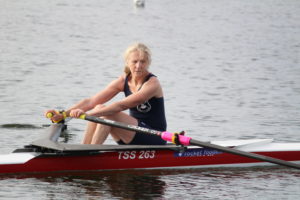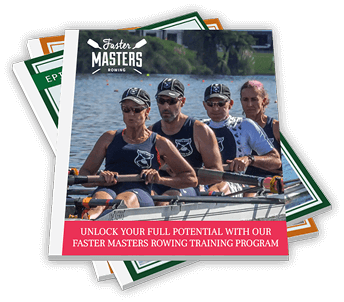
We got this email from a customer who is returning to rowing. Her experience and our advice may help you.
Hi Marlene and Rebecca
Can you give me any tips on how to get started with the programme and how to build myself up from pottering around on the river to actual training? I’m 62 next week, was a successful heavyweight senior rower in the 1980s but always very inflexible and prone to back injuries. I taught myself how to scull a single in 1977 but only raced for the first time in August 2018. I won my first two races but the third regatta in mid June 2019 was a disaster, I felt really weak, lost by miles, and haven’t raced since.
I signed up to Faster Masters at the end of May 2020, full of good resolutions even though I wasn’t very fit. I gradually started back sculling in and built up my mileage so I am doing 10k to 11k in my single at what is probably Cat VI. When I have tried the faster rowing sessions I couldn’t get anywhere near the suggested stroke rates and found that very dispiriting. It’s very hard to track progress on our river because of the variable flow and wind conditions but my splits seem to be considerably higher than the times local women scullers my age achieved in a time trial I missed even though I have been sculling longer than any of them.
During lockdown I had no erg access and, even though I do now, I have eventually developed costochondritis every time I have used ergs for serious training since I returned to masters rowing in 2003 so I avoid them now. We can usually row here if the river isn’t in flood or it isn’t blowing a gale, as we don’t get frost or snow even though it isn’t very warm.
I live beside the boathouse and am retired so I have plenty of time and I thought I was going out five days a week but my husband reckons that it’s more like two or three days. I do reformer Pilates twice a week normally and am currently doing a video mat class as we have locked down again. I’ve started running once a week with a group and am actually enjoying it despite my asthma.
Maybe one of the documents set out how to build up to full race training from a low base, apologies if it does but I didn’t see it.
You are asking all the right questions.
What all returning rowers have to learn is that you aren't that girl in the 1980s any more.
You (and we) all need to learn what our mature bodies can cope with and how long we take to recover from any exercise stress. And that includes recovering from coughs and colds and other ailments too.
Start with 3 sessions on the water a week.
The three core sessions are marked on the programme with an asterisk.
Buy a heart rate monitor to wear in the boat and note when your HR rises because that's a sign you are getting tired.
Do the land training on non-water rowing days so you improve your strength and flexibility.
Do a daily waking Heart Rate Variability test as this will tell you how "recovered" you are from the prior day's training. There's an app called HRV4Training which you can use. [more information here from their blog https://www.hrv4training.com/blog ]
This will help you work out how much training to do as you mention running and pilates and your mat class as additional training sessions. That's at least 6 sessions a week although the pilates may not be aerobic, it still gives you a workout.
Be guided by how you feel
Build up the program based on how your body copes with the training load. If you start by doing 50% of the volume of each rowing water session and only do the 3 core sessions a week. Do that for 2 weeks.
Then add about 500m more each outing until you are comfortable and your HRV recovery scores are confirming that your fitness and recovery is tracking positively. Be confident that holding steady and not adding 500m more distance is fine. This is your body adapting to training again. And you can step back down if you are tired and only want to do a couple of kms on the water. Use it to practice technique - lots of stationary roll ups or pause rowing drills.
Use the erg and water interchangeably - so if the weather isn't good, you can erg even if you don't like it much.
I also suggest keeping a written training diary.
Note how energised you feel before the workout. What training you did. How tired (scores out of 5 or 10) you feel afterwards. That will help you with subjective gauge of your body and your mental approach to each workout. It is not a bad thing to cut a workout short if you are tired or it's not going well.
Be patient and kind to yourself!
And best wishes, let us know how you go after the first 4 weeks.
Rebecca and Marlene

